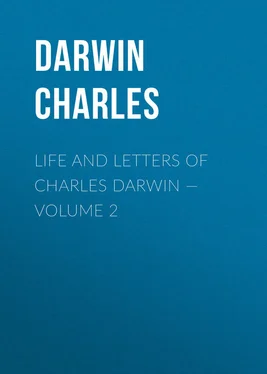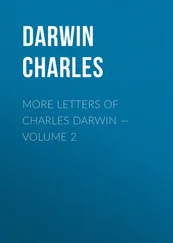Charles Darwin - Life and Letters of Charles Darwin — Volume 2
Здесь есть возможность читать онлайн «Charles Darwin - Life and Letters of Charles Darwin — Volume 2» — ознакомительный отрывок электронной книги совершенно бесплатно, а после прочтения отрывка купить полную версию. В некоторых случаях можно слушать аудио, скачать через торрент в формате fb2 и присутствует краткое содержание. Жанр: foreign_antique, foreign_prose, на английском языке. Описание произведения, (предисловие) а так же отзывы посетителей доступны на портале библиотеки ЛибКат.
- Название:Life and Letters of Charles Darwin — Volume 2
- Автор:
- Жанр:
- Год:неизвестен
- ISBN:нет данных
- Рейтинг книги:3 / 5. Голосов: 1
-
Избранное:Добавить в избранное
- Отзывы:
-
Ваша оценка:
- 60
- 1
- 2
- 3
- 4
- 5
Life and Letters of Charles Darwin — Volume 2: краткое содержание, описание и аннотация
Предлагаем к чтению аннотацию, описание, краткое содержание или предисловие (зависит от того, что написал сам автор книги «Life and Letters of Charles Darwin — Volume 2»). Если вы не нашли необходимую информацию о книге — напишите в комментариях, мы постараемся отыскать её.
Life and Letters of Charles Darwin — Volume 2 — читать онлайн ознакомительный отрывок
Ниже представлен текст книги, разбитый по страницам. Система сохранения места последней прочитанной страницы, позволяет с удобством читать онлайн бесплатно книгу «Life and Letters of Charles Darwin — Volume 2», без необходимости каждый раз заново искать на чём Вы остановились. Поставьте закладку, и сможете в любой момент перейти на страницу, на которой закончили чтение.
Интервал:
Закладка:
My book has been as yet VERY MUCH more successful than I ever dreamed of: Murray is now printing 3000 copies. Have you finished it? If so, pray tell me whether you are with me on the GENERAL issue, or against me. If you are against me, I know well how honourable, fair, and candid an opponent I shall have, and which is a good deal more than I can say of all my opponents...
Pray tell me what you have been doing. Have you had time for any Natural History?..
P.S. — I have got — I wish and hope I might say that WE have got — a fair number of excellent men on our side of the question on the mutability of species.
CHARLES DARWIN TO J.D. HOOKER. Down, December 14th [1859].
My dear Hooker,
Your approval of my book, for many reasons, gives me intense satisfaction; but I must make some allowance for your kindness and sympathy. Any one with ordinary faculties, if he had PATIENCE enough and plenty of time, could have written my book. You do not know how I admire your and Lyell's generous and unselfish sympathy, I do not believe either of you would have cared so much about your own work. My book, as yet, has been far more successful than I ever even formerly ventured in the wildest day-dreams to anticipate. We shall soon be a good body of working men, and shall have, I am convinced, all young and rising naturalists on our side. I shall be intensely interested to hear whether my book produces any effect on A. Gray; from what I heard at Lyell's, I fancy your correspondence has brought him some way already. I fear that there is no chance of Bentham being staggered. Will he read my book? Has he a copy? I would send him one of the reprints if he has not. Old J.E. Gray (John Edward Gray (1800-1875), was the son of S.F. Gray, author of the 'Supplement to the Pharmacopoeia.' In 1821 he published in his father's name 'The Natural Arrangement of British Plants,' one of the earliest works in English on the natural method. In 1824 he became connected with the Natural History Department of the British Museum, and was appointed Keeper of the Zoological collections in 1840. He was the author of 'Illustrations of Indian Zoology,' 'The Knowsley Menagerie,' etc., and of innumerable descriptive Zoological papers.), at the British Museum, attacked me in fine style: "You have just reproduced Lamarck's doctrine and nothing else, and here Lyell and others have been attacking him for twenty years, and because YOU (with a sneer and laugh) say the very same thing, they are all coming round; it is the most ridiculous inconsistency, etc., etc."
You must be very glad to be settled in your house, and I hope all the improvements satisfy you. As far as my experience goes, improvements are never perfection. I am very sorry to hear that you are still so very busy, and have so much work. And now for the main purport of my note, which is to ask and beg you and Mrs. Hooker (whom it is really an age since I have seen), and all your children, if you like, to come and spend a week here. It would be a great pleasure to me and to my wife... As far as we can see, we shall be at home all the winter; and all times probably would be equally convenient; but if you can, do not put it off very late, as it may slip through. Think of this and persuade Mrs. Hooker, and be a good man and come.
Farewell, my kind and dear friend, Yours affectionately, C. DARWIN.
P.S. — I shall be very curious to hear what you think of my discussion on Classification in Chapter XIII.; I believe Huxley demurs to the whole, and says he has nailed his colours to the mast, and I would sooner die than give up; so that we are in as fine a frame of mind to discuss the point as any two religionists.
Embryology is my pet bit in my book, and, confound my friends, not one has noticed this to me.
CHARLES DARWIN TO ASA GRAY. Down, December 21st [1859].
My dear Gray,
I have just received your most kind, long, and valuable letter. I will write again in a few days, for I am at present unwell and much pressed with business: to-day's note is merely personal. I should, for several reasons, be very glad of an American Edition. I have made up my mind to be well abused; but I think it of importance that my notions should be read by intelligent men, accustomed to scientific argument, though NOT naturalists. It may seem absurd, but I think such men will drag after them those naturalists who have too firmly fixed in their heads that a species is an entity. The first edition of 1250 copies was sold on the first day, and now my publisher is printing off, as RAPIDLY AS POSSIBLE, 3000 more copies. I mention this solely because it renders probable a remunerative sale in America. I should be infinitely obliged if you could aid an American reprint; and could make, for my sake and the publisher's, any arrangement for any profit. The new edition is only a reprint, yet I have made a FEW important corrections. I will have the clean sheets sent over in a few days of as many sheets as are printed off, and the remainder afterwards, and you can do anything you like, — if nothing, there is no harm done. I should be glad for the new edition to be reprinted and not the old. — In great haste, and with hearty thanks,
Yours very sincerely, C. DARWIN.
I will write soon again.
CHARLES DARWIN TO C. LYELL. Down, 22nd [December, 1859].
My dear Lyell, Thanks about "Bears" (See 'Origin,' edition i., page 184.), a word of il-omen to me.
I am too unwell to leave home, so shall not see you.
I am very glad of your remarks on Hooker. (Sir C. Lyell wrote to Sir J.D. Hooker, December 19, 1859 ('Life,' ii. page 327): "I have just finished the reading of your splendid Essay [the 'Flora of Australia'] on the origin of species, as illustrated by your wide botanical experience, and think it goes very far to raise the variety-making hypothesis to the rank of a theory, as accounting for the manner in which new species enter the world.") I have not yet got the essay. The parts which I read in sheets seemed to me grand, especially the generalization about the Australian flora itself. How superior to Robert Brown's celebrated essay! I have not seen Naudin's paper ('Revue Horticole,' 1852. See historical Sketch in the later editions of the 'Origin of Species.'), and shall not be able till I hunt the libraries. I am very anxious to see it. Decaisne seems to think he gives my whole theory. I do not know when I shall have time and strength to grapple with Hooker...
P.S. — I have heard from Sir W. Jardine (Jardine, Sir William, Bart., 1800-1874), was the son of Sir A. Jardine of Applegarth, Dumfriesshire. He was educated at Edinburgh, and succeeded to the title on his father's decease in 1821. He published, jointly with Mr. Prideaux, J. Selby, Sir Stamford Raffles, Dr. Horsfield, and other ornithologists, 'Illustrations of Ornithology,' and edited the 'Naturalist's Library,' in 40 volumes, which included the four branches: Mammalia, Ornithology, Ichnology, and Entomology. Of these 40 volumes 14 were written by himself. In 1836 he became editor of the 'Magazine of Zoology and Botany,' which, two years later, was transformed into 'Annals of Natural History,' but remained under his direction. For Bohn's Standard Library he edited White's 'Natural History of Selborne.' Sir W. Jardine was also joint editor of the 'Edinburgh Philosophical Journal,' and was author of 'British Salmonidae,' 'Ichthyology of Annandale,' 'Memoirs of the late Hugh Strickland,' 'Contributions to Ornithology,' 'Ornithological Synonyms,' etc. — (Taken from Ward, 'Men of the Reign,' and Cates, 'Dictionary of General Biography.'): his criticisms are quite unimportant; some of the Galapagos so-called species ought to be called varieties, which I fully expected; some of the sub-genera, thought to be wholly endemic, have been found on the Continent (not that he gives his authority), but I do not make out that the species are the same. His letter is brief and vague, but he says he will write again.
Читать дальшеИнтервал:
Закладка:
Похожие книги на «Life and Letters of Charles Darwin — Volume 2»
Представляем Вашему вниманию похожие книги на «Life and Letters of Charles Darwin — Volume 2» списком для выбора. Мы отобрали схожую по названию и смыслу литературу в надежде предоставить читателям больше вариантов отыскать новые, интересные, ещё непрочитанные произведения.
Обсуждение, отзывы о книге «Life and Letters of Charles Darwin — Volume 2» и просто собственные мнения читателей. Оставьте ваши комментарии, напишите, что Вы думаете о произведении, его смысле или главных героях. Укажите что конкретно понравилось, а что нет, и почему Вы так считаете.












